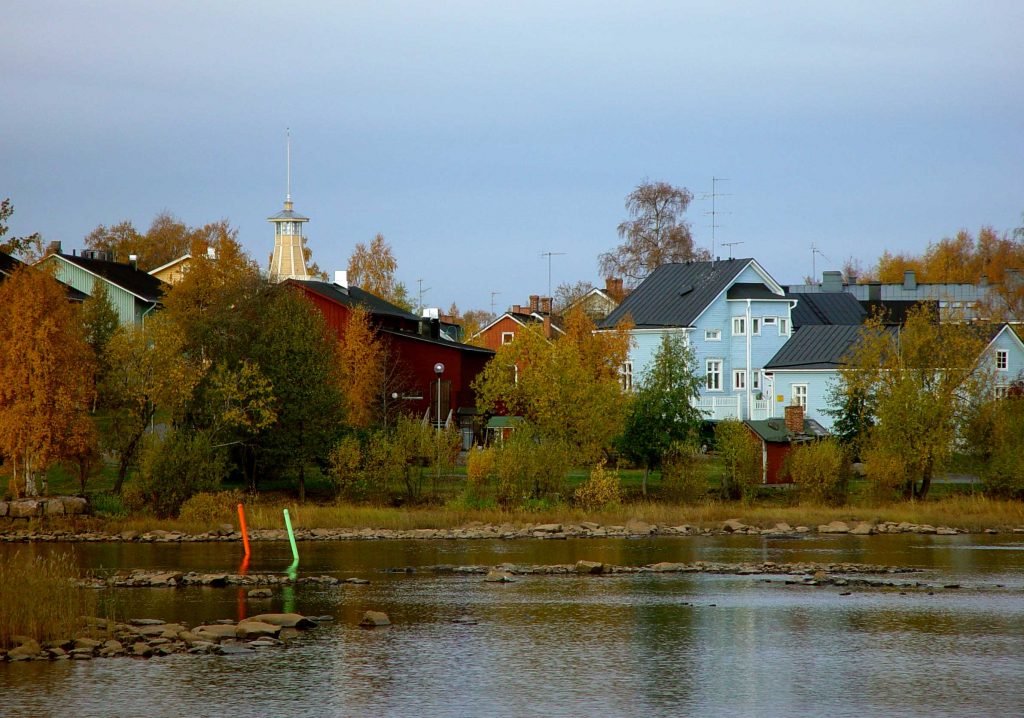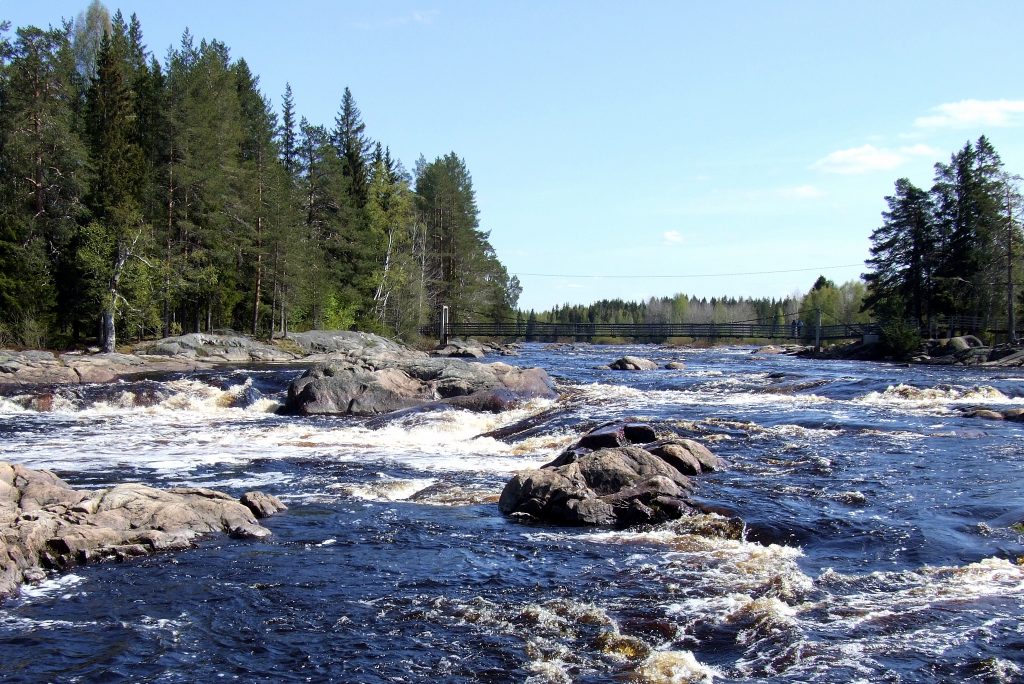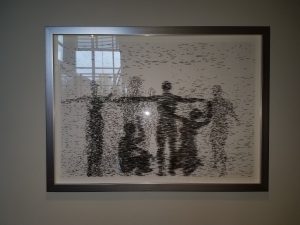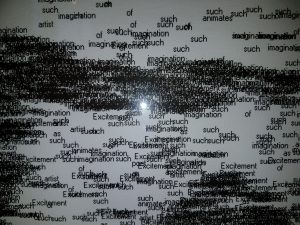Lively Oulu, the pearl of Fennoscandia, is a gateway to urban culture as well as to the unique nature of the North. This is where modern business meets northern peace and exoticism. Founded in 1605 by King Charles IX of Sweden, Oulu charms with its light and lushness and has an interesting history.
The former salmon and tar capital has evolved into a major high-tech centre, particularly in IT and wellness technology. The university has the world’s first 5G test network and the city itself has been nominated as the most intelligent community in Europe–twice. The city has one of the youngest populations in Europe and it is bound to do big things also in the future.
The word “Oulu” is probably derived from the Sámi word for “flood water” and quite fittingly, the city has a seaside feel to it. The archipelago nature is just around the corner and beautiful parks are all around. In the fall, the whole city takes a tint of red, yellow and brown called “ruska”, as the ubiquitous trees and bushes change colour in the anticipation of winter.
We hope you will take some time to become acquainted with the city of Oulu. The best way to do that is to take part in some of our exciting excursions!

Oulu Guided sightseeing tour by foot
A two-hour walk takes you from the new monumental centre to the old one. You will hear interesting and funny stories about the people and events of the past, see where the long narrow boats full of tar barrels landed and visit the old storehouses by the sea. You will also get to know the guardian of the market hall, a statue of a policeman “Toripolliisi” – a figure loved by everyone.1
Price: 15 / person
Date: September 24, 2018
Register

Guided sightseeing tour by bus:
Today the people of Oulu design software, produce the finest paper in the world, and do business all over the world. This bus tour takes you to the river, the seaside, the marshlands, and the woods. You will visit the old and new monumental centres of Oulu, the sites of culture and technology. During the tour, you will hear stories about tar merchants, ship builders, seafarers, and salmon fishers, and get a feel of the history of Oulu.1
Price: 23 € / person
Date: September 24, 2018
Register

Kierikki, Poro-Panuma & Koiteli2
Note! Maximum 60 participants!
This day trip takes you to three interesting and beautiful natural sites in the outskirts of Oulu.
First, the Kierikki Stone Age Centre takes you back in time thousands of years into the distant past of the North. The Kierikki Centre is located along the Iijoki river on a Stone Age dwelling site that has been studied since the 1960s.

The Kierikki Centre’s permanent exhibition explores local and regional pre-history and life in the Stone Age in a fascinating and entertaining way. It features the greatest finds of the excavation, including a mammoth’s molar tooth that is 35,000 years old! The road to the Stone Age village is a wide boardwalk with beautiful views to the nearby Iijoki river and the archaeological excavation is open to the public in summer. You might find something really old!

The trip also takes you to the Panuma village located in the middle of wilderness, one of the oldest villages of reindeer husbandry in the southern reindeer management area. No less than seven generations have already been practising reindeer husbandry at Poro-Panuma. You will see reindeer, reindeer and reindeer at the wilderness farm so make sure to charge your cameras!

Lastly, you will spend a wonderful afternoon in Koiteli, an island located in the middle of two beautiful rapids. Peaceful surroundings, ancient trees, and real Finnish coffee by open fire will relax the body and the mind. Take time to stroll around the trekking paths and listen to the forest like a true Finn.

Preliminary schedule:
9:00 Departure from Oulu
9:45 Arrival in Kierikki Stone Age Center
10:00 – 11:00 Guided tour in Stone Age Village
11:00 – 11.30 Visiting the museum
11:30 – 12:15 Lunch
12:45 – 13:45 Visiting Reindeer Farm Poro-Panuma
14:30 – 15:30 Visiting Koiteli Rapids and afternoon coffee by open fire
About 16:00 – 16:30 Arrival back to Oulu
Price: 118 € / person
Date: September 28, 2018
Register
Includes: Transportation in the tourist bus, an English-speaking tour leader during the whole trip, lunch, entrance fee to the Kierikki Stone Age Center, a guided tour in the Stone Age village, visit to the reindeer farm, and afternoon coffee in Koiteli.
Ranua Zoo, Arktikum & Santa Claus Village3
This tour is an arctic one! We will take you to Lapland, to the Ranua Zoo, to experience the wild arctic. The Ranua Wildlife Park specialises in arctic and northern animal species. The spacious animal fencings are located in the midst of northern conifer forests, the natural habitat of most of the animals.

You can see the only polar bears living in Finland, as well as 50 other arctic and northern animal species, 200 individuals, altogether. Say hi to arctic foxes, huge moose, musk oxen, and Venus the polar bear and her cub Sisu.


From Ranua, we journey north to Arktikum, the science centre and museum that lets you experience northern nature, culture and history up close. Finland’s northernmost and largest province, Lapland has been home to permanent settlements and a broad network of northern peoples for thousands of years. The exhibitions illustrate the history of Lapland, its cultures, nature, and other contemporary themes. Familiarize yourself with the Lapland War, the occupations and livelihoods in the north, the unique natural characteristics, reindeer herding, as well as the Sámi people.

Finally, we will take you all the way to the Arctic Circle to meet none other than Santa Claus at the official Santa Claus village. You can take a photo with the one and only Santa and let him know what you want for Christmas well in advance. You will get to cross the Arctic Circle, also known as the border of hastiness, where regular time changes into the magic time of elves and reindeer. Lapland might steal your heart, so be warned!

Preliminary schedule
8:00 Departure from Oulu
10:00 Arrival in Ranua
10:00 – 12:00 Visit to the Ranua Zoo
12:00 – 13:00 Lunch
13:00 Drive to Rovaniemi
14:00 – 15:30 Guided visit to science center Arktikum.
16:00 – 17:30 Visit to Santa Claus village and Arctic Circle
17:30 Departure back to Oulu
Price: 145 € / person
Date: September 28, 2018
Register
Includes: Transportation in the tourist bus, an English-speaking tour leader during the whole trip, lunch, the entrance fees to the Ranua Zoo and Arktikum, and a guided tour in Arktikum.
If, for any reason, there were not enough participants, a trip would be canceled and you will receive a FULL refund
1. Oulun kaupungintalo © Oulun kaupunki.
2. Kierikki: Kierikki exhibition © Esa Eirola; Leiri7 © Oulun luuppi.
Koiteli: koiteli.
Poro-Panuma: kesaaita1 © Poro-Panuma.
3. Oulun kaupungintalo © Oulun kaupunki.
 Information Literacy in Everyday Life
Information Literacy in Everyday Life















